Sumba Island: Famous for its traditional villages and pristine beaches
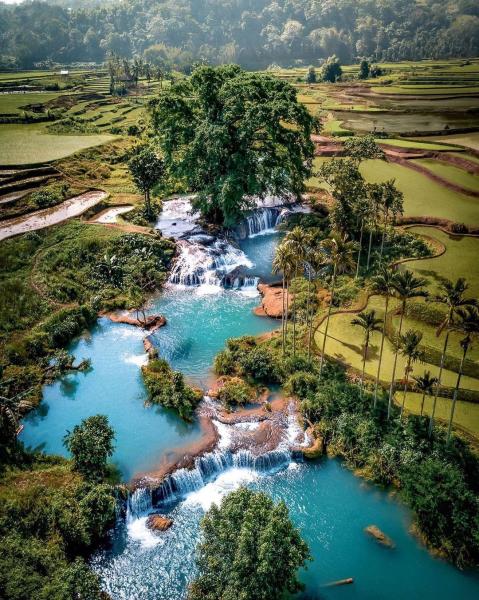
Things to Do in Sumba Island, Indonesia: A Detailed Guide
Sumba Island, part of Indonesia’s East Nusa Tenggara province, is a hidden gem for travelers seeking untouched natural beauty, vibrant culture, and authentic local experiences. Known for its stunning landscapes, rich traditions, and serene beaches, Sumba offers a unique opportunity to explore beyond the typical tourist hotspots. Here’s a detailed guide to the best things to do in Sumba Island.
1. Visit the Traditional Villages
Sumba is home to several traditional villages, each with its own unique customs, architecture, and culture. These villages offer visitors a chance to step back in time and experience the island’s ancient way of life.
- Pasunga Village: Known for its impressive megalithic tombs and the traditional Sumbanese houses called “Uma Kalada.” The villagers here still practice their ancient rituals and live by the old ways, including the use of large buffalo skulls as symbols of status.
- Ratenggaro Village: Located on the southwest coast, this village is famous for its traditional thatched-roof houses and stunning location by the beach. Visitors can learn about the indigenous Marapu belief system, which shapes the culture and daily life of the Sumbanese people.
- Waikabubak: The capital of West Sumba, Waikabubak is home to several cultural sites, including the famous week-long Pasola festival, where locals reenact ancient horse-riding battles to honor their ancestors.
2. Explore the Stunning Beaches
Sumba’s beaches are some of the most picturesque in Indonesia, with white sandy shores, crystal-clear waters, and a peaceful, untouched ambiance. Some must-visit beaches include:
- Marosi Beach: Located on the southwest coast, Marosi is famous for its clear waters and excellent surf spots. This beach is perfect for those looking for solitude or a place to catch some waves.
- Karelpiu Beach: An unspoiled paradise in the southern part of the island, Karelpiu Beach is ideal for swimming, sunbathing, and relaxing. The tranquil setting makes it a perfect escape from the hustle and bustle of everyday life.
- Watu Malandong Beach: A pristine stretch of sand with crystal-clear waters and striking coastal scenery, this beach is perfect for swimming, picnicking, or simply taking in the beauty of nature.
- Pero Beach: This is one of the most popular beaches on the island, known for its golden sands and rolling surf waves. It's a popular destination for surfing, swimming, and beach picnics.
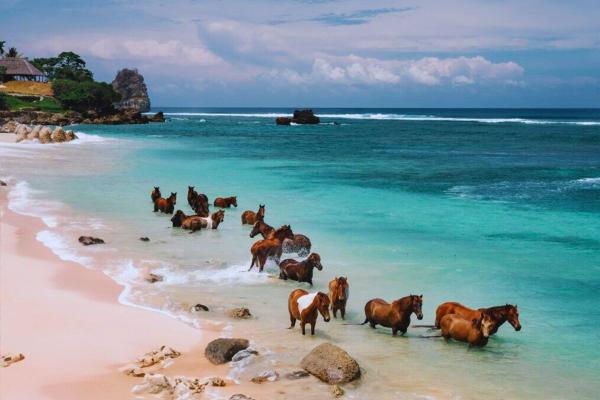
3. Go Surfing
Sumba is gaining a reputation as a world-class surfing destination, with some of Indonesia’s best surf spots located on the island. The island offers a variety of breaks suited to all skill levels, from beginners to advanced surfers.
- Lakey Peak: One of the most well-known surf spots in Sumba, Lakey Peak offers consistent waves and is renowned for its long rides. Whether you’re an experienced surfer or a beginner, Lakey Peak has waves to suit your style.
- Nihiwatu Beach: Nihiwatu is home to one of the most famous surf breaks in Indonesia—"The Occy’s Left." It’s a world-class left-hand reef break known for its long, powerful waves. Surfers from all over the world come to challenge the waters here.
- Tanjung Bunga: Tanjung Bunga offers more mellow waves, making it a perfect choice for those who prefer a more relaxed surfing experience. The beach’s secluded setting adds to its appeal.
4. Discover Sumba’s Waterfalls
Sumba Island is rich in natural beauty, and its waterfalls are a big part of that. From serene, hidden gems to grand cascades, the island’s waterfalls are an excellent way to immerse yourself in its natural wonders.
- Weekuri Lake: A crystal-clear lagoon surrounded by lush greenery, Weekuri Lake is often mistaken for a waterfall destination due to its mesmerizing appearance. It’s a great spot for swimming and a serene experience in nature.
- Tiu Kelep Waterfall: Located in the east of Sumba, this majestic waterfall is one of the island’s most famous. A picturesque hike through lush forests leads to the towering waterfall, where you can enjoy a refreshing dip in the cool waters below.
- Waimarang Waterfall: Situated near the village of Waimarang, this waterfall cascades down in multiple layers into a natural pool below. It's a perfect place to take a swim and enjoy the peaceful surroundings.
5. Attend the Pasola Festival
If you’re in Sumba in February or March, you should not miss the Pasola Festival. This unique event celebrates the island's rich cultural heritage, where villagers from various parts of Sumba participate in mock battles riding horses. The festival has religious significance and is dedicated to the Marapu gods to ensure a good harvest. The festival is a colorful, vibrant event that showcases the island’s warrior traditions and is an unforgettable cultural experience.
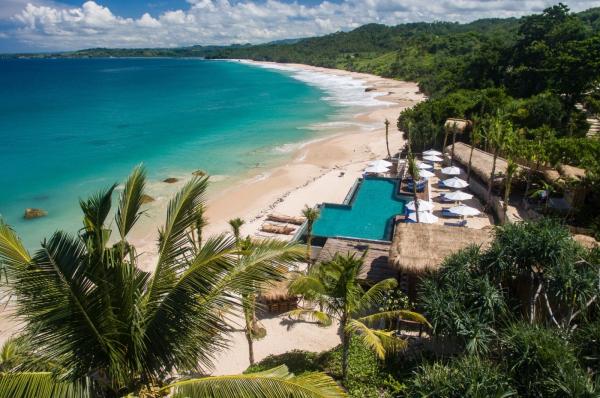
6. Trekking and Hiking
Sumba’s rugged and hilly terrain is perfect for trekking and hiking, offering scenic vistas, untouched nature, and a sense of adventure.
- Bukit Wairinding: This hilltop provides panoramic views of Sumba’s undulating landscapes, particularly during sunrise or sunset. The hill is adorned with traditional thatched houses and rice fields, making it a perfect spot for a hike.
- Sumba’s Highlands: The island’s highlands are full of potential for those seeking more rugged hiking experiences. The area offers rolling hills, hidden valleys, and pristine nature, making it ideal for those wanting to experience a more challenging trek.
7. Discover the Local Cuisine
Sumba’s food reflects its rich cultural heritage and diverse influences. Traditional Sumbanese dishes are centered around rice, tubers, and meat, particularly buffalo and pork. Be sure to try:
- Mie Goreng Sumba: A local variation of fried noodles, often served with pork or beef.
- Jukut Sumba: A Sumbanese soup made from vegetables, rice, and meat, offering a light yet flavorful taste.
- Babi Guling: Sumba’s version of roasted pig, often cooked for special ceremonies and celebrations. The dish is rich in flavor and part of the island's culinary traditions.
8. Stay at Nihiwatu Resort
For those seeking luxury on the island, the Nihiwatu Resort in the southwest of Sumba is an excellent choice. This exclusive resort offers stunning ocean views, world-class service, and a variety of activities, including surfing, spa treatments, and cultural immersion experiences. The resort is situated next to the famous Nihiwatu Beach, offering easy access to one of the best surf breaks in the world.
9. Explore the Sumba Foundation and Eco-Tourism Initiatives
Sumba has been making strides in eco-tourism and sustainable development, with the Sumba Foundation playing a crucial role in improving local communities’ quality of life. Visitors can learn more about the foundation’s efforts to preserve the island’s environment and culture while contributing to local development. The foundation also operates several community tourism initiatives, where travelers can stay in local villages and participate in traditional activities.
10. Horseback Riding
Sumba is known for its distinctive breed of horses, the Sumba horse. These horses are integral to the culture and daily life of the island’s people. Visitors can take horseback riding tours through the island’s stunning landscapes, including beaches, forests, and hills. Riding these horses gives you a chance to experience the island in an authentic way, offering a glimpse into the lifestyle of the Sumbanese people.
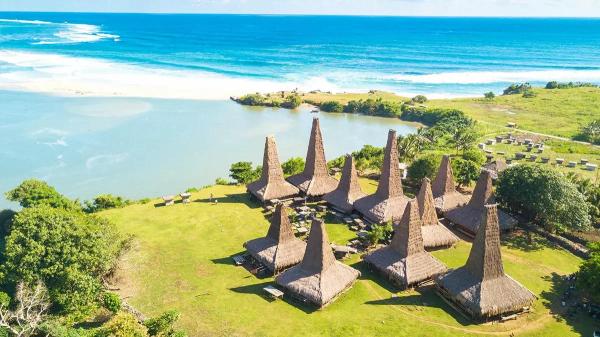
11. Shopping for Traditional Handicrafts
Sumba is famous for its weaving traditions. The island’s ikat textiles, known for their vibrant colors and intricate patterns, are a prized souvenir for visitors. You can find these textiles in local markets or from the weavers themselves in traditional villages. These handwoven fabrics are often used to create beautiful clothing, blankets, and ceremonial garments.
12. Cultural Experiences with Local Artisans
Sumba is renowned for its craftsmanship, particularly in textiles, pottery, and woodwork. Engaging with local artisans offers a unique opportunity to understand the island’s culture in a more intimate way.
- Ikat Weaving: Traditional Sumbanese weaving, known as Ikat, is a centuries-old art form where natural dyes and intricate patterns are used to create colorful fabrics. Visitors can watch the entire weaving process in villages such as Prailiu and Kodi, where artisans share their skills and techniques. These textiles are not just beautiful; they are deeply symbolic, often linked to the Marapu religion and used for ceremonial purposes.
- Pottery Making: Some villages on the island are known for their traditional pottery, crafted using techniques passed down for generations. You can visit these villages and try your hand at creating your own piece of pottery, often made from clay found near the beaches.
- Wood Carving: Sumba also has a rich tradition of wood carving, and you can visit local workshops to see how intricate sculptures, masks, and religious artifacts are made from native woods like cedar. These works often feature symbolic patterns related to the island's indigenous beliefs.
13. Wildlife Watching and Nature Exploration
Sumba Island’s biodiversity makes it an excellent destination for nature lovers and wildlife enthusiasts. The island’s remote location and relatively low human population have allowed unique species to thrive in the lush environment.
- Sumba’s Endemic Wildlife: One of the most interesting aspects of Sumba’s wildlife is the presence of endemic species that are not found anywhere else in the world. The Sumba Komodo Dragon, a smaller cousin of the famous Komodo dragon, is native to the island. Though elusive, sightings of these rare creatures are an unforgettable experience.
- Birdwatching: Sumba is home to a wide variety of bird species, making it a great destination for birdwatching. Notable species include the Sumba hornbill, yellow-crested cockatoo, and several species of eagles. The island's diverse ecosystems, from coastal mangroves to mountain forests, offer opportunities to spot these vibrant birds in their natural habitats.
- Hunting and Gathering Tour: For those looking for an immersive experience, some local guides offer tours that introduce you to the island’s flora and fauna. These tours include foraging for edible plants, learning about traditional medicinal herbs, and understanding how the island’s indigenous people live in harmony with nature.
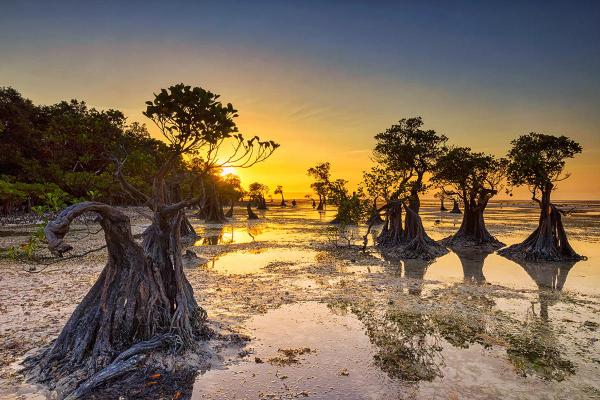
14. Adventure and Extreme Sports
For those seeking an adrenaline rush, Sumba has a growing reputation as an adventure sport destination. The island's rugged terrain and coastline offer opportunities for extreme sports and outdoor activities.
- Trekking to Hidden Caves: Sumba is dotted with mysterious caves and grottos that can only be accessed by trekking through the island’s dense forests and rocky landscapes. The Boro Caves near Waikabubak are a perfect example, featuring impressive stalactites and stalagmites, where travelers can explore dark passageways and hidden chambers.
- Mountain Biking: The rugged hills and remote roads of Sumba make for an exciting mountain biking experience. You can ride through remote villages, hillsides, and forests while enjoying the challenge of steep ascents and thrilling descents.
- Cliff Diving: For the brave-hearted, Sumba offers some epic cliff diving opportunities. The cliffs near Watu Karere offer an exhilarating experience, with jumps into the blue waters below.
15. Wellness and Spiritual Retreats
If you are looking for a more relaxed and introspective experience on Sumba, the island offers several wellness and spiritual retreats where you can rejuvenate both body and mind.
- Nihiwatu Spa & Wellness: The Nihiwatu Resort is home to an award-winning spa, offering everything from traditional Indonesian massages to holistic treatments that focus on rejuvenation and relaxation. The tranquil surroundings of the resort, combined with natural healing methods, make it a perfect place for a wellness escape.
- Marapu Healing Practices: The island’s Marapu religion involves spiritual practices that are deeply rooted in nature. Some tours and spiritual retreats offer insight into these beliefs and rituals. Visitors can partake in ceremonies, receive blessings from shamans, and learn about traditional healing methods used by the locals.
- Yoga Retreats: As Sumba’s tourism industry slowly grows, more yoga retreats are popping up, offering visitors the chance to practice in the middle of the island's pristine landscapes. With the sound of the ocean waves, fresh air, and jungle surroundings, these retreats offer a holistic approach to relaxation and well-being.
16. Explore Sumba’s History and Archaeological Sites
Sumba has a rich history, and many archaeological sites and cultural landmarks dot the island. The remnants of ancient civilizations, megalithic structures, and sacred sites can be explored, giving visitors a glimpse into Sumba’s past.
- Megalithic Tombs and Burial Sites: Some of the most fascinating cultural sites on Sumba are the megalithic tombs. These ancient burial sites, which often feature large stone structures and tombs, date back thousands of years. The Pasunga Village and Bubukira are known for their significant megalithic tombs.
- Sumba’s Sacred Hills: Certain hills in Sumba are considered sacred by the local Marapu people. These areas, such as the Tana Rata, hold historical significance and are the burial grounds for Sumbanese kings and nobles. While visiting, respect for local traditions and customs is crucial.
- The Kalembu Wato Burial Site: Another notable historical site is Kalembu Wato, a village with a large number of standing stones and burial sites. This site is known for its preserved ancient stone monuments, offering an extraordinary view of Sumba’s prehistoric past.
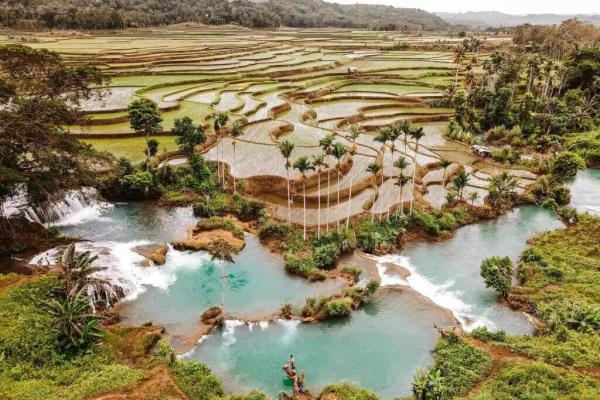
17. Relax and Unwind at Local Guesthouses and Homestays
For a more intimate and community-oriented experience, consider staying at one of Sumba’s guesthouses or homestays. These family-run accommodations offer insight into local life and customs and can provide an authentic experience that larger resorts cannot match.
- Traditional Sumbanese Homes: Staying in a traditional Uma Kalada—a Sumbanese thatched house—gives you a first-hand experience of the island’s rural way of life. These homestays are often located near remote villages, providing an immersive cultural experience.
- Eco-Lodges: If you are looking for more sustainable lodging, several eco-lodges have sprung up around Sumba. These lodges focus on using local materials, maintaining eco-friendly practices, and contributing to community development. Nihiwatu Lodge and Lelewatu Resort are excellent examples of this trend.
18. Photographic Opportunities
Sumba’s rugged beauty, stunning landscapes, and vibrant culture make it a photographer's dream. Whether you're a professional photographer or simply someone who enjoys taking snapshots of your travels, Sumba offers endless opportunities for capturing stunning imagery.
- Landscapes and Sunsets: Sumba’s unique mix of landscapes—from rolling hills and rice terraces to pristine beaches and dramatic cliffs—provides plenty of opportunities for landscape photography. Catching a sunset at Ratenggaro Beach or Tanjung Bunga is a must.
- Traditional Ceremonies and Festivals: Participating in or observing the local Pasola festival, the Wula Wula, or a traditional marriage ceremony provides excellent photo opportunities to capture the heart of Sumba's cultural life.
- Wildlife Photography: For wildlife photographers, Sumba offers a chance to capture rare species like the Sumba horse, wild buffalo, and exotic birds in their natural environments.
Conclusion
Sumba Island is a place where adventure, culture, and nature converge in an extraordinary way. Whether you're seeking the thrill of surfing world-class waves, experiencing authentic cultural practices, or simply relaxing in breathtaking surroundings, Sumba offers something for every kind of traveler. The island’s unspoiled beauty, warm people, and rich traditions make it a destination that is as rare as it is unforgettable. By exploring all that Sumba has to offer, you’ll leave with memories of a truly unique and enriching experience.
About the Author:
 Jopie Liputra is an avid traveler and passionate explorer who loves discovering new places and cultures. When not traveling, Jopie dives deep into travel blogs and official resources to uncover hidden gems and the best things to do in destinations around the world. His articles are a blend of personal experience and meticulous research, perfect for inspiring your next adventure. Connect with Jopie on LinkedIn.
Jopie Liputra is an avid traveler and passionate explorer who loves discovering new places and cultures. When not traveling, Jopie dives deep into travel blogs and official resources to uncover hidden gems and the best things to do in destinations around the world. His articles are a blend of personal experience and meticulous research, perfect for inspiring your next adventure. Connect with Jopie on LinkedIn.
No comments yet. Be the first to add a review.